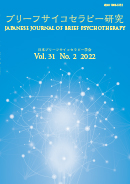Volume 31, Issue 2
Displaying 1-13 of 13 articles from this issue
- |<
- <
- 1
- >
- >|
Article
-
2023 Volume 31 Issue 2 Pages 37-48
Published: March 31, 2023
Released on J-STAGE: May 24, 2023
Download PDF (849K)
Research and Practice
-
2023 Volume 31 Issue 2 Pages 49-59
Published: March 31, 2023
Released on J-STAGE: May 24, 2023
Download PDF (645K)
Symposium
-
2023 Volume 31 Issue 2 Pages 60-61
Published: March 31, 2023
Released on J-STAGE: May 24, 2023
Download PDF (202K) -
2023 Volume 31 Issue 2 Pages 62-64
Published: March 31, 2023
Released on J-STAGE: May 24, 2023
Download PDF (271K) -
2023 Volume 31 Issue 2 Pages 65-67
Published: March 31, 2023
Released on J-STAGE: May 24, 2023
Download PDF (291K) -
2023 Volume 31 Issue 2 Pages 68-70
Published: March 31, 2023
Released on J-STAGE: May 24, 2023
Download PDF (312K) -
2023 Volume 31 Issue 2 Pages 71-73
Published: March 31, 2023
Released on J-STAGE: May 24, 2023
Download PDF (281K)
Symposium
-
2023 Volume 31 Issue 2 Pages 74
Published: March 31, 2023
Released on J-STAGE: May 24, 2023
Download PDF (181K) -
2023 Volume 31 Issue 2 Pages 75-78
Published: March 31, 2023
Released on J-STAGE: May 24, 2023
Download PDF (364K) -
2023 Volume 31 Issue 2 Pages 79-82
Published: March 31, 2023
Released on J-STAGE: May 24, 2023
Download PDF (439K) -
2023 Volume 31 Issue 2 Pages 83-86
Published: March 31, 2023
Released on J-STAGE: May 24, 2023
Download PDF (385K)
Brief Essay
-
2023 Volume 31 Issue 2 Pages 87
Published: March 31, 2023
Released on J-STAGE: May 24, 2023
Download PDF (223K) -
2023 Volume 31 Issue 2 Pages 88-89
Published: March 31, 2023
Released on J-STAGE: May 24, 2023
Download PDF (272K)
- |<
- <
- 1
- >
- >|
